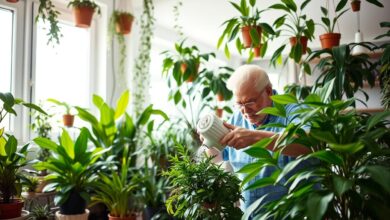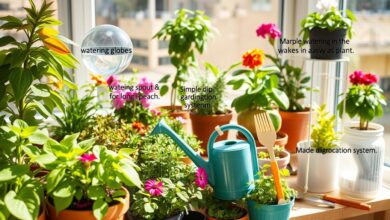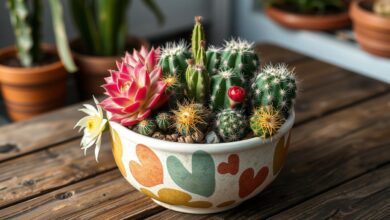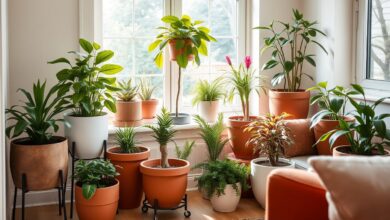Easy-Care Best Houseplants for Seniors to Grow at Home
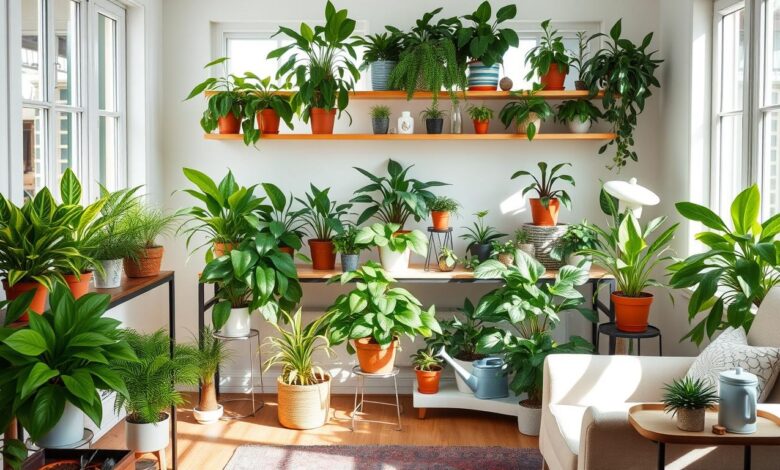
Starting an indoor garden is a great way to bring peace and happiness into your home. The best houseplants for seniors are perfect for this. They can turn your space into a calm retreat, good for your body and mind. We’ll look at some easy-care indoor plants that are great for older adults.
Table of Contents
Benefits of Indoor Gardening for Older Adults
Indoor gardening is a great gift for seniors. It brings many physical and mental health benefits. Plants purify the air and reduce stress, showing their incredible power.
Physical Health Benefits
Indoor plants help seniors stay active. They keep muscles strong and flexible. Plants like peace lilies and snake plants also clean the air, helping those with weak immune systems.
They also make the air more humid. This can help with breathing problems.
Mental Health Advantages
Being around plants can make seniors happier. It lowers stress and boosts brain function. Tending to plants gives a sense of purpose and calm.
Therapeutic gardening for seniors keeps the mind sharp. It helps fight loneliness.
Stress Reduction Properties
Indoor plants make people feel relaxed and less anxious. Gardening therapy can even lower blood pressure and help with healing. Indoor gardening for elderly people helps manage stress and improves well-being.
Succulents are known to be the easiest indoor plants to manage, thriving in almost any environment and adjusting well to drought conditions.
Therapeutic gardening is becoming more popular. Seniors can enjoy a healthy and peaceful home by adding plants. This enriches their lives, benefiting both body and mind.
Best Houseplants for Seniors: Top Low-Maintenance Options
Gardening is a rewarding hobby, especially for seniors. It’s important to pick plants that need little care. Luckily, there are many easy indoor plants that are great for older adults. Plants like the elegant peace lily and the tough aloe vera can brighten any room with little effort.
The peace lily is a top choice for seniors. It likes warm, humid places and not too much sunlight. It even tells you when it needs water by drooping its leaves. Another good pick is the African violet, which blooms a lot and does well near windows.
- Aloe vera, a succulent, grows best in sunny spots and likes dry soil. Its gel can soothe minor burns and skin issues.
- Spider plants clean the air and do well in bright to medium light with moist soil. They have beautiful, trailing leaves.
- The Amazon elephant ear plant brings a tropical feel to any room. It needs a warm, humid spot and should avoid direct sunlight.
These easy plants can make your home look great and offer many benefits for seniors. By choosing the right indoor plants, older adults can enjoy the benefits of gardening with little effort.
Snake Plant: The Ultimate Beginner-Friendly Choice
If you’re a senior wanting to bring some greenery home, the snake plant is perfect. It’s tough and doesn’t need much care. It grows well in low light and can handle dry spells, great for those who forget to water.
Light and Water Requirements
Snake plants need only 6-8 hours of indirect sunlight daily. They’re great for dark spots or areas with little natural light. They’re also very good at handling dry spells, needing water only once every 2 weeks, depending on the season and humidity.
Air-Purifying Qualities
Snake plants are not just easy to care for; they also clean the air. They remove toxins like formaldehyde and benzene, making your home healthier. Plus, they release oxygen at night, perfect for bedrooms.
Snake plants are ideal for seniors who want to add some greenery without the hassle. They’re tough, tolerate low light, and purify the air. Try one and see how it enhances your home.
“Snake plants can reach heights of 3-4 feet and are available in various varieties, including some with cream or yellow borders.”
Peace Lily: Elegant and Easy to Maintain
If you’re looking for an air-purifying plant that does well in low-light houseplant spots, the peace lily is great. These plants have dark green leaves and beautiful white flowers. They add a touch of elegance to any room.
Peace lilies are known for cleaning the air. They remove harmful chemicals like benzene and formaldehyde. They also have a calming effect, improving the energy in a room, according to feng shui.
What’s special about peace lilies is how easy they are to care for. They can handle different light levels and only need watering when the soil is dry. Mist their leaves to keep them shiny and to mimic their natural habitat’s humidity.
“Peace lilies are one of the best indoor plants for health and wellbeing, thanks to their air-purifying abilities and calming presence.” – Gardening Expert
To keep your peace lily happy, feed it monthly with a balanced fertilizer during the growing season. Remove any yellow or brown leaves. You can also divide the plant to make it fuller.
Peace lilies are perfect for seniors or anyone who wants a beautiful, easy-to-care-for plant. They bring the beauty of the tropics into your home. Enjoy their air-purifying qualities and their low-maintenance care.
Spider Plant: A Classic Choice for Indoor Spaces
Spider plants (Chlorophytum comosum) are great for homes with pets. They grow well in many indoor spots, making them perfect for seniors and beginners. Their long leaves and ability to spread out make them a favorite among easy-care houseplants.
Propagation Tips
Spider plants are easy to spread. They grow small plantlets, or “spiderettes,” on their stems. To start a new plant, just cut off a healthy plantlet with some stem. Plant it in a pot, and it will grow into a full spider plant.
Care Instructions
- Well-drained, slightly acidic soil with a pH of 5.0-7.0
- Bright, indirect sunlight for 8-10 hours per day
- Water when the top 2 inches of soil are dry
- Prune off any dead or dying leaves to maintain a tidy appearance
Spider plants are perfect for seniors and those who want easy-to-care plants. They are safe for pets and add beauty to any room. Just follow these simple tips to enjoy their beauty for years.
Aloe Vera: Therapeutic Benefits and Simple Care
If you’re looking for a non-toxic houseplant with healing powers, aloe vera is perfect. It’s easy to care for and has many health benefits. It’s great for therapeutic gardening for seniors.
Aloe vera can soothe burns and calm skin irritations. It even helps wounds heal. The gel in its leaves has anti-inflammatory and antimicrobial properties. This makes it a natural remedy for sunburns, cuts, and scrapes.
“Aloe vera is a true wonder plant, offering both beauty and practical benefits for the home. Its healing properties and low-maintenance care make it an ideal choice for seniors seeking to nurture their wellbeing through indoor gardening.”
Keeping an aloe vera plant healthy is easy, even for beginners. They love bright, indirect light and need water only when the soil is dry. This makes them perfect for seniors who want to enjoy therapeutic gardening without much work.
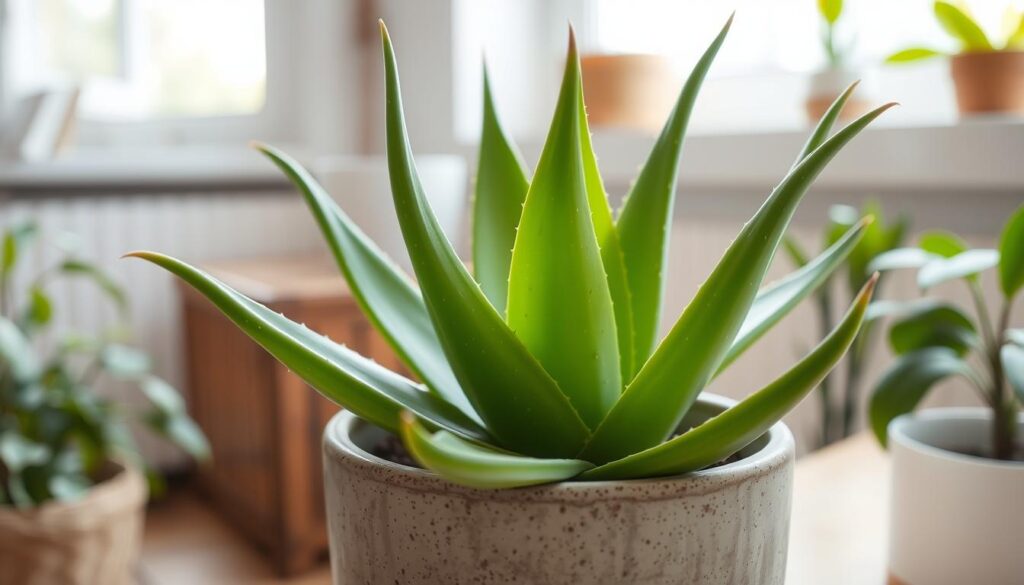
Aloe vera is great for purifying the air, soothing skin, or just for its calming presence. Its many benefits make it a must-have for any senior’s indoor garden.
ZZ Plant: Thriving in Low-Light Conditions
Seniors looking for easy-to-care-for houseplants will love the ZZ plant (Zamioculcas zamiifolia). It does well in low light, perfect for homes with little sunlight. Its shiny, dark green leaves make any room look elegant.
Drought Tolerance Features
The ZZ plant is known for its ability to handle drought. It can survive for weeks without water, great for seniors who forget or are busy. Its thick stems store water, keeping it looking green even when neglected.
Growth Patterns
The ZZ plant grows slowly and stays small, ideal for tight spaces. It usually grows 2-3 feet tall and wide. Its upright, bushy shape adds beauty to any room.
To care for your ZZ plant, use a potting mix that drains well. It needs at least 6 hours of indirect light daily. Water when the top 3 inches of soil are dry. With little effort, this plant can brighten up your home.
Cast Iron Plant: Living Up to Its Name
Looking for a tough and easy-to-care-for indoor plant? The cast iron plant (Aspidistra elatior) is perfect. It’s known for being very hardy and can handle many conditions. This makes it great for seniors and those new to gardening.
It grows well in zones 7 to 11, reaching 2-3 feet tall and 1-2 feet wide. It can handle different soils with a pH of 7-11.
This plant loves low light, needing only 3-4 hours of bright, indirect light a day. It prefers to be watered about 1 inch per week. Let the soil dry a bit before watering again.
Cast iron plants grow slowly but are very resilient. If they look stressed, like yellow leaves or wilting, they can usually recover. A little extra care and a spring fertilizer can help them grow.
- Tolerates a wide range of soil types and pH levels (7-11)
- Thrives in partial to full shade, requiring just 3-4 hours of bright, indirect light daily
- Watering needs are approximately 1 inch per week, with soil allowed to slightly dry out between waterings
- Slow-growing but highly resilient, able to recover from various stresses
- Indoor plants benefit from spring fertilization, while outdoor plants may need annual fertilization
For seniors or beginners, the cast iron plant is a fantastic choice. It’s tough, easy to care for, and adds beauty to any home.
Chinese Evergreen: Perfect for Dim Spaces
If you’re looking for a tough, low-light houseplant, the Chinese evergreen is great. It can grow well in dark corners. This plant is perfect for indoor spaces because it can handle different light levels.
Varieties and Colors
The Chinese evergreen stands out with its many leaf colors. Leaves can be silver, gray, green, pink, or red. This makes it a beautiful addition to any room. Its ability to adjust to different lights makes it a great choice for adding greenery to dark spots.
Maintenance Guide
- Prefers low to medium light conditions, with temperatures between 60-75°F.
- Requires consistently moist, but not waterlogged, soil to thrive.
- Note: All parts of the Chinese evergreen plant are toxic, so keep it away from curious pets and children.
“The Chinese evergreen is a true low-light champion, flourishing in even the dimmest of spaces and adding a pop of color to any indoor environment.”
The Chinese evergreen is a great choice for seniors and others. It’s easy to care for and adds beauty to low-light homes. By adding this plant to your indoor garden, you can enjoy clean air and a nicer living space.
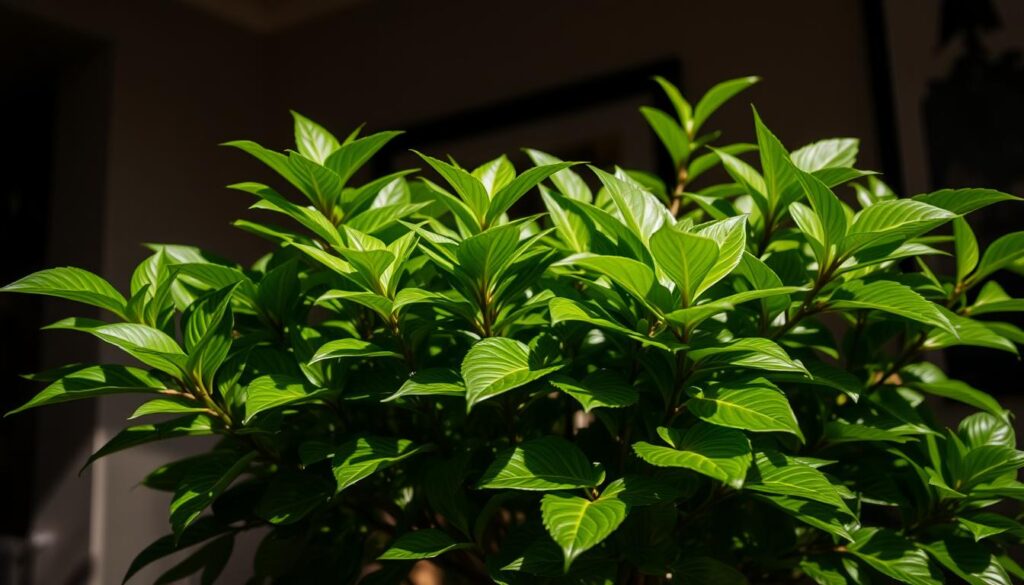
Rubber Plant: Statement-Making and Resilient
If you’re looking for a houseplant that stands out, the Rubber Plant is perfect. It has big, shiny leaves that can reach 12 inches long. These leaves add elegance and interest to any room.
Rubber plants are not just pretty; they’re also tough. They can handle different light levels, from bright to dim. They’re great for seniors and beginners. Plus, they clean the air by removing toxins like formaldehyde.
The Rubber Plant is very adaptable. It does well in various soils, as long as the pH is right. It likes its soil moist but not too wet. This makes it easy to care for and prevents root rot.
To keep your Rubber Plant looking good, wipe its leaves often. This keeps them shiny and prevents dust from building up.
Whether you’re new to plants or have been growing them for years, the Rubber Plant is a great pick. It’s easy to care for and looks amazing. It’s a wonderful choice for seniors’ homes because of its beauty and air-purifying abilities.
Heart-Leaf Philodendron: Graceful Trailing Beauty
Bring beauty to your home with the heart-leaf philodendron (Philodendron hederaceum oxycardium). This plant is easy to care for and has shiny, heart-shaped leaves. It grows long vines that can hang down or climb up.
This plant loves light but can also do well in darker spots. It’s happy in temperatures between 60-80°F. Make sure the soil isn’t too wet, and it will thrive.
Even though it’s beautiful, the heart-leaf philodendron is toxic. Keep it away from pets and kids. It’s perfect for seniors who want a low-maintenance plant.
“The heart-leaf philodendron is a true testament to the beauty and resilience of nature. Its captivating leaves and trailing vines make it a must-have for any indoor gardener.”
There are over 450 types of philodendrons worldwide. They come in many shapes and sizes. Whether you like the Rojo Congo or the Pink Princess, there’s a philodendron for you.
- Philodendrons are popular tropical plants that thrive in warm, humid environments.
- Heart-leaf philodendrons feature fast-growing, heart-shaped leaves that can grow up to 8 inches wide if allowed to climb.
- Philodendrons prefer partial sun exposure and can tolerate low-light conditions, making them excellent choices for senior gardeners.
Essential Care Tips for Senior Gardeners
Keeping an indoor garden healthy and vibrant is a great hobby for seniors. It’s key to know how to care for plants. By setting up a regular watering schedule and managing light, your plants will grow well with little work.
Watering Schedules
Watering your plants right is vital. Use a soil moisture meter to check when they need water. Succulents like cacti and aloe vera need water only once or twice a month.
On the other hand, spider plants and peace lilies do well with more frequent, moderate watering. Creating a routine for each plant’s needs helps keep them hydrated.
Light Management
Getting the right light for your plants is also crucial. Snake plants and ZZ plants can do well in low light. But, peace lilies and African violets need bright, indirect sunlight.
Place your plants where they get the right amount of light. Rotating them now and then ensures even growth and prevents one side from getting too big.
FAQ
What are the benefits of indoor gardening for older adults?
What are some low-maintenance houseplants suitable for seniors?
What are the key features of the snake plant?
What are the care requirements for a peace lily?
What are the benefits of growing a spider plant?
What makes aloe vera a great choice for seniors?
What are the unique features of the ZZ plant?
How does the cast iron plant get its name?
What makes the Chinese evergreen a good choice for seniors?
What are the key features of the rubber plant?
What makes the heart-leaf philodendron a good choice for seniors?
How can seniors care for their houseplants effectively?
Source Links
- These 7 Low-Maintenance Houseplants Are Perfect for Frequent Travelers – https://www.bhg.com/houseplants-for-travelers-8683581
- 5 Houseplants You (Probably) Can’t Kill – https://www.realsimple.com/low-maintenance-indoor-plants-8704665
- Looking for a new houseplant? Here are our faves! – https://www.countryliving.com/gardening/garden-ideas/g1341/indoor-gardening/
- Indoor Gardening for Elderly Individuals: 4 Garden Ideas & Benefits for Seniors | Family Matters – https://familymattershc.com/indoor-gardening-for-elderly/
- How Caring for Plants Benefits Seniors Aging in Place – https://lareshomecare.com/how-caring-for-plants-benefits-seniors-aging-in-place/
- Benefits of raising house plants – https://www.salemnews.net/opinion/local-columns/2024/04/benefits-of-raising-house-plants/
- Going Green: 5 Easy to Grow Plants for Seniors – myLifeSite – https://mylifesite.net/blog/post/going-green-5-easy-to-grow-plants-for-seniors/
- These 35 Low-Maintenance Plants Will Thrive Indoors All Winter Long – https://www.housebeautiful.com/lifestyle/gardening/g31355906/easy-low-maintenance-plants/
- Easy Houseplants Even Beginners Can’t Kill – https://www.southernliving.com/garden/indoors/best-indoor-plants?srsltid=AfmBOopAyVeURwnQXAqGWAN0r_eoD23xQZJLkNA_heBsvtF65IqEwRy7
- Easy Houseplants Even Beginners Can’t Kill – https://www.southernliving.com/garden/indoors/best-indoor-plants?srsltid=AfmBOoqe6sloGzXpfjjyaPyDR-ihYFVerA1T7FP0HtMG8Bt8aMSIsTED
- Why I Love Snake Plants – https://therosetable.com/2024/02/08/why-i-love-snake-plants/
- Snake Plants: The Perfect Houseplants for Busy Individuals – Houseplant Advice – Garden Health – https://www.gardenhealth.com/advice/houseplant-care/snake-plants-the-perfect-houseplants-for-busy-individuals
- How to care for a peace lily – an expert guide to getting the most out of these beautiful houseplants – https://www.womanandhome.com/homes/how-to-care-for-a-peace-lily-an-expert-guide/
- How to care for peace lilies – https://www.houseandgarden.co.uk/article/peace-lily-how-to-care-for-peace-lilies
- How to Care for Peace Lilies | Gardener’s Supply – https://www.gardeners.com/how-to/peace-lily-care/9699.html?srsltid=AfmBOoqoRg2twHbwNdc8xW_CdFLLA1dAhhfhX5SNZVwo5aAu6dqx8sTK
- Top 6 Easy Houseplants for Seniors to Enjoy – https://www.backyardboss.net/houseplants-perfect-for-seniors/
- Low-Maintenance Plants for Senior Living Spaces – Senior Indoor Fun – https://seniorindoorfun.com/low-maintenance-plants-for-senior-living-spaces/
- Here’s the Ultimate Aloe Vera Plant Care Guide for New Plant Parents – https://www.goodhousekeeping.com/home/gardening/g19682442/aloe-plant-care/
- How to Care for Aloe Vera Plants & Health Benefits – Everything You Need to Know! – https://planetdesert.com/blogs/news/aloe-vera-plant-care-health-benefits-types-of-aloe-vera?srsltid=AfmBOoqPbtihvKIqEsbyKEFKBzfNTwlj1FbFVQdJZNTbcubo_BJAW1Fn
- 7 Therapeutic Houseplants That Will Enhance Your Health And Wellbeing – https://www.gardeningknowhow.com/houseplants/therapeutic-houseplants
- The Easiest Indoor Plants that Thrive in Low Light – https://roomfortuesday.com/the-easiest-indoor-plants-that-thrive-in-low-light/
- 35 Best Low-Light Indoor Plants That’ll Thrive in the Colder Months – https://www.housebeautiful.com/lifestyle/gardening/g2628/low-light-houseplants/
- Cast Iron Plants Can Survive in Any Home – https://www.housebeautiful.com/lifestyle/gardening/a61948936/cast-iron-plant-growing-care-guide/
- Easy Houseplants Even Beginners Can’t Kill – https://www.southernliving.com/garden/indoors/best-indoor-plants?srsltid=AfmBOoqNZMkW3xOEeC1i2QxBXyxzcZDjlkPVFqZgqW2dID89XX2jkrkt
- Cast Iron Plant – https://www.livelyroot.com/products/cast-iron-plant?srsltid=AfmBOopjKQkdzZVMpZPsLwquNiv9d_aEcWzpbOyPQNeXtufdTwv5QcX1
- 14 Low-Light Houseplants That Thrive in Dim Indoor Spaces – https://www.provenwinners.com/learn/houseplants/low-light
- Low-Light Houseplants for the Home – https://greenthingsaz.com/low-light-houseplants-for-the-home/
- Rubber Plant Varieties and Care: A Complete Guide to Growing These Stu – https://www.houseplant.co.uk/blogs/houseplant-indoor-plant-a-z/rubber-plant-varieties-and-care
- 10 Houseplants That Can Improve Indoor Air Quality – https://varnishandvine.com/blogs/cactus-and-plant-information/10-houseplants-that-can-improve-indoor-air-quality?srsltid=AfmBOoq6urYMGGWHgthnq7ezX0dhiNfXmnTjsCbv76SS8j76iGnhL-Mz
- 10 Benefits Of Having A Rubber Plant – https://greg.app/rubber-plant-benefits/
- 24 Stunning Philodendron Varieties You Need to Know About – https://www.realsimple.com/home-organizing/gardening/indoor/philodendron-varieties
- Trailing Indoor Plants to Enhance Your Home’s Look and Feel | Homes To Love – https://www.homestolove.com.au/outdoor-gardening/gardening/trailing-indoor-plants-12481/
- The Benefits of Life having houseplants for the Elderly – Manor Retirement – https://www.manor-retirement.co.za/the-benefits-of-life-having-houseplants-for-the-elderly/
- The Best Plants and Flowers for Senior Citizens’ Homes – https://www.bloomsybox.com/blog/posts/the-best-plants-and-flowers-for-senior-citizens-homes?srsltid=AfmBOooV3VdyCu7fnf5LAv652PJvikg4ENrTChznQuIU-0d_9XtwpRPx

